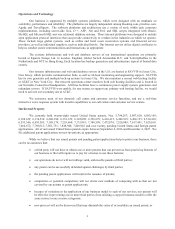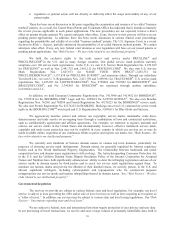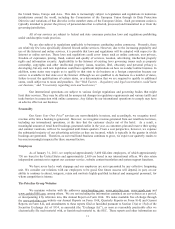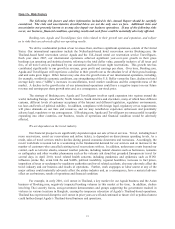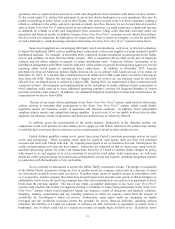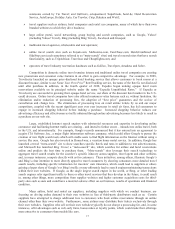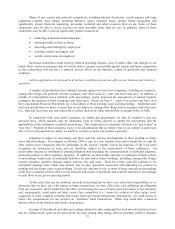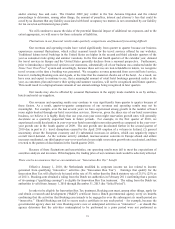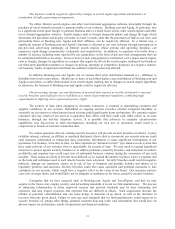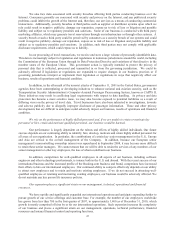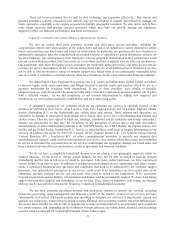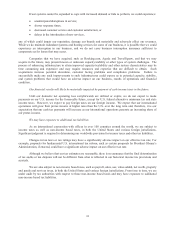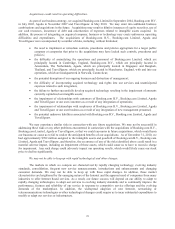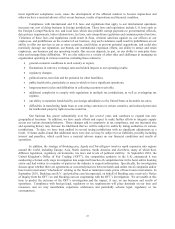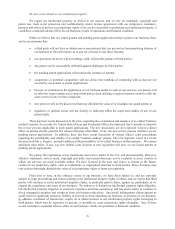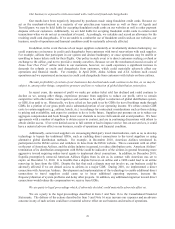Priceline 2010 Annual Report Download - page 93
Download and view the complete annual report
Please find page 93 of the 2010 Priceline annual report below. You can navigate through the pages in the report by either clicking on the pages listed below, or by using the keyword search tool below to find specific information within the annual report.19
and/or attorney fees and costs. The October 2009 jury verdict in the San Antonio litigation and the related
proceedings to determine, among other things, the amount of penalties, interest and attorney’s fees that could be
owed by us illustrate that any liability associated with hotel occupancy tax matters is not constrained by our liability
for tax owed on our historical gross profit.
We will continue to assess the risks of the potential financial impact of additional tax exposure, and to the
extent appropriate, we will reserve for those estimates of liabilities.
Fluctuations in our financial results make quarterly comparisons and financial forecasting difficult.
Our revenues and operating results have varied significantly from quarter to quarter because our business
experiences seasonal fluctuations, which reflect seasonal trends for the travel services offered by our websites.
Traditional leisure travel bookings in the United States are higher in the second and third calendar quarters of the
year as consumers take spring and summer vacations. In the first and fourth quarters of the calendar year, demand
for travel services in Europe and the United States generally declines from a seasonal perspective. Furthermore,
prior to introducing a retail travel option to our customers, substantially all of our business was conducted under the
Name Your Own Price® system and accordingly, because those services are non-refundable in nature, we recognize
travel revenue at the time a booking was generated. We recognize revenue generated from our retail hotel service,
however, including Booking.com and Agoda, at the time that the customer checks out of the hotel. As a result, we
have seen and expect to continue to see, that a meaningful amount of retail hotel bookings generated earlier in the
year, as customers plan and reserve their spring and summer vacations, will not be recognized until future quarters.
This could result in a disproportionate amount of our annual earnings being recognized in later quarters.
Our results may also be affected by seasonal fluctuations in the supply made available to us by airlines,
hotels and rental car suppliers.
Our revenues and operating results may continue to vary significantly from quarter to quarter because of
these factors. As a result, quarter-to-quarter comparisons of our revenues and operating results may not be
meaningful. For example, over the last several years we have experienced strong growth in the number of hotel
room nights booked through our hotel reservation services. However, given the sheer size of our hotel reservation
business, we believe it is highly likely that our year-over-year room night reservation growth rates will generally
decelerate on a quarterly sequential basis in future periods. For example, in the first quarter of 2010, we
experienced a mild deceleration in year-over-year hotel room night reservation growth as compared to the year-over-
year growth rate in the fourth quarter of 2009. The unit growth rate decelerated further in the second quarter of
2010 due in part to (1) travel disruptions caused by the April 2010 eruption of a volcano in Iceland, (2) general
uncertainty about the European economy and (3) substantial increases in airfares, which can negatively impact
overall travel demand. As the volcanic activity subsided, macroeconomic concerns in Europe abated and airfare
increases moderated, our third quarter year-over-year hotel room night reservation growth rate accelerated, and then
reverted to the pattern of deceleration in the fourth quarter 2010.
Because of these fluctuations and uncertainties, our operating results may fail to meet the expectations of
securities analysts and investors. If this happens, the trading price of our common stock would be adversely affected.
There can be no assurance that we can maintain our “Innovation Box Tax” benefit
Effective January 1, 2010, the Netherlands modified its corporate income tax law related to income
generated from qualifying “innovative” activities (the “Innovation Box Tax”). Earnings that qualify for the
Innovation Box Tax will effectively be taxed at the rate of 5% rather than the Dutch statutory rate of 25.5% (25% as
of 2011). Booking.com obtained a ruling from the Dutch tax authorities in February 2011 confirming that a portion
of its earnings (“qualifying earnings”) is eligible for Innovation Box Tax treatment. The ruling from the Dutch tax
authorities is valid from January 1, 2010 through December 31, 2013 (the “Initial Period”).
In order to be eligible for Innovation Box Tax treatment, Booking.com must, among other things, apply for
and obtain a research and development (“R&D”) certificate from a Dutch governmental agency every six months
confirming that the activities that Booking.com intends to be engaged in over the subsequent six month period are
“innovative.” Should Booking.com fail to secure such a certificate in any such period – for example, because the
governmental agency does not view Booking.com’s new or anticipated activities as “innovative” – or should this
agency determine that the activities contemplated to be performed in a prior period were not performed as


